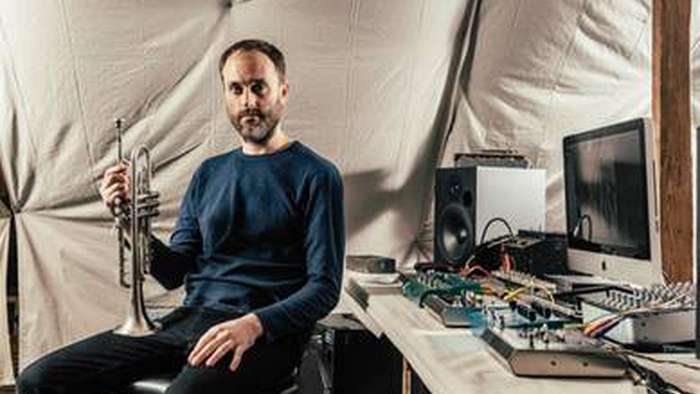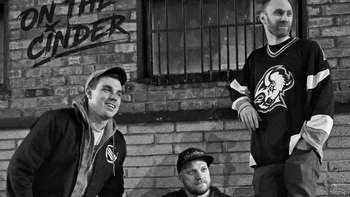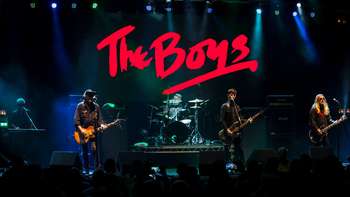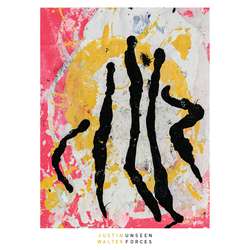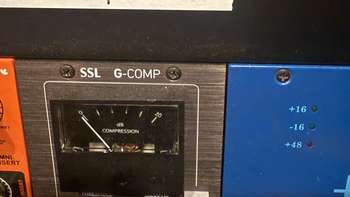Justin Walter recently released his new album, the fantastic Unseen Forces, masterfully conducting a sonic journey through the abstract realms of experimentalism. To further understand the artist's process we had a discussion with Justin about his new record, how his sound has evolved through the years, the process of collaboration, differences between improvisation and structured songwriting, among more. Dive into for a thorough dialogue on the essence of musicianship, its practices and its capabilities.
Scene Point Blank: Hi Justin. Firstly, thanks for finding the time to do this interview, it is much appreciated! Unseen Forces is the first album where you are completely on your own. How was that experience compared to having collaborators, or working in a band setting?
Justin Walter: It seems like working with a band you get some music together and then go into the studio and maybe mess around with it a bit, but basically you're trying to bust out an album in a certain amount of time. Being in the studio is expensive. And working with other people on your own solo project can be somewhat similar, perhaps you just need to get some sounds that you'll work with on your own over a longer period of time, but there's still an element of using other people's time.
On this record, I did work with Erik Hall at his home in Chicago. We probably spent a total of 6 or 7 days recording and mixing, most of that was just running the process through and seeing what we got. Only a couple of those recordings made it to this album: the title track, "End of Six" and "Red Cabin" -- which are actually one recording broken in half. "End of Six" and "Red Cabin" is what happened at the end of the 6th 45-minute track we recorded on one of the first days we spent together. Most of the time that was put into making this album was spent by myself at home. I didn't have any deadline and there were periods of months that would go by and the music I had would just kind of sit around in my head and brew a bit. Constructing some of these pieces was a real journey for me, adding, reducing, mixing. Although everything on the record is improv based, the actual construction, placement and form that those recordings took and the way the pieces were chosen and put in sequence happened over a very long period of time.
"It's silly to mess around and record take after take when what you're going for is emotional content"
Scene Point Blank: You have been a member of jazz/fusion collective NOMO, worked with Bambi Kino Duo, and contributed to works of His Name Is Alive and Colin Stetson, all of which are quite diverse acts. Do you find any difficulty in adapting to their sound?
Justin Walter: Not at all. Putting music together by yourself is like making a special art piece. It shapes over time and is your own personal commentary on the world as you understand it. And although it might be made up of performance material, it's construction and overall meaning is shaped by the ideas in your head. It has a language and message that is internal to itself. Working with other groups seems to be more of a preconceived effort. Like, here we all are to make this piece of music come to life. Everyone has their parts to play and you listen and do your job. It's a totally different thing and I enjoy both. Bambi Kino is probably the closest I've come to merging the two. Brian came to me with some thought out things that he would do, and they were very open, I just made up the stuff I payed on the spot and while we recorded I was very much feeding of what he was doing. So we came with an idea, but then let it go wherever it seemed fit to go.
Scene Point Blank: You have previously released the Dark Matter EP, and Lullabies & Nightmares. How would you compare Unseen Forces to your previous works? How would you describe the evolution of your sound?
Justin Walter: Those earlier records were more documentaries on what I was making at the time. This new record is more of a concept piece. A lot more work went into finding the material and pulling it together to create a cohesive statement. In terms of evolution I would say that my sound/vision is more focused, stronger and less abstract in relation to the music world at large.
Scene Point Blank: With the absence of vocals, do you find there is a degree of difficulty in conveying your messages, in a purely instrumental form?
Justin Walter: I don't. I've recorded vocals in the past and actually recorded a couple vocal numbers over the past few years that also ran their course. I like the voice, but here it's not necessary. This is music that is about melodic, harmonic and textural relation. The vocabulary is internal and relates to itself to create meaning. Perhaps I'll think of how I would like to incorporate voice in a future recording. Would be sweet!
Scene Point Blank: You have talked about Unseen Forces being a collection of completely improvised parts, that can either stand on their own or be used as basis for further improvisation. How different do you find this mode of producing from conventional songwriting?
Justin Walter: Traditionally you'd sit down and write out your music and work with it on paper, on a computer, or even just in your head until you get it to where you want it to be, then head into the studio and record it. With this, the thing that I'm looking for is that sound that I could never have thought up and written out. Just trying over and over to capture something special that can only be found through chance, abandon, in the moment realizations, and of course some skill. It's more the emotion that is important, the notes don't really matter.
Scene Point Blank: There are two different sides to Unseen Forces, one focusing on sonic textures and the other on jazz improvisation. Which is the more difficult to get right in your opinion? How do you balance between the two?
Justin Walter: The jazz improvisations happen in real time and are usually first take/best take. It's silly to mess around and record take after take when what you're going for is emotional content, so unless there's some huge mess up or problem, the live recordings of improvisation are just done once and it's usually best that way. The textures and sequencing and mixing of those and everything else take forever. And I wouldn't say that it is more "difficult", it's all very enjoyable it just takes longer to get it right.

Scene Point Blank: There are some references in numbers in your new album, with “Sixty” and “End of Six.” Can you discuss the significance of these titles, and also your opening track with “1001” referring to the binary form of the number nine?
Justin Walter: No secret meaning there. Coltrane put out a number of songs that were like "Untitled 1794" or something. Probably some studio take stuff. I thought that was funny. So I was recording so much that coming up with song names was just driving me batty and it was getting hard to remember what was what and the names were just getting more and more embarrassing, so I just started using numbers.
Scene Point Blank: You have a true sonic artefact, the Electronic Valve Instrument (EVI.) Can you tell us how did it come to your possession? What are the qualities that you find intriguing in the EVI?
Justin Walter: My friend Dan Bennett (Bari sax player in NOMO) pointed me to the midi EWI and, through that, I found out about the EVI. It's great. Analog synth that is controlled with a handheld device that plays somewhat like a trumpet. It's a very unique instrument and can create some of the most unusual melodies. Its structure allows for the player to play with both intuition and purpose at the same time and cover the whole range of the sonic spectrum in a way that is fairly effortless. Lucky for me nobody else plays it like that :)
Seeing what strange and interesting things this instrument can do is sort of my mission statement, I suppose. There are a few guys out there that play it linearly very well and it's just amazing to me that they have developed the skill to do that. It would be very hard to do and they do it very well. John Swana and Mike Metheny are the first two that come to mind. And of course Marshall Allen, who I guess just plays it fairly randomly, which is cool. I like to explore the way the instrument can fuse the random tendencies it leans to with an ear for melody.
Scene Point Blank: Apart from the EVI, and since there is a fair amount of electronic music in your works, are there any other synthesizers that you experiment with? Do you ever go in-the-box, using software synthesizers?
Justin Walter: Nope. Everything is EVI. The title track has piano and trumpet and the following song also has some trumpet. All of the other sounds on the record are created either by playing the EVI live or using it as a sort of paint brush to create a scene that can then be sampled and sequenced. Oh, there is also a kalimba sample on 'it's not what you think'
Scene Point Blank: Given that Unseen Forces was recorded solely by you, I am quite interested in learning more about the recording process. How did you record the album? Was it a completely DIY approach or did you have any engineer(s) through the different stages?
Justin Walter: Erik Hall, who by the way is also a member of NOMO, past contributor to His Name is Alive, and has his own amazing project In Tall Buildings, helped in the recording and mixing of a number of the songs on this and my previous record. During the recording of this record I was teaching myself how to mix this music and learning protools. Working with Erik was extremely helpful and educational. Learned a lot. So yeah, I would do a mix and send it his way and see if the sub was blowing up on his end and that kind of stuff. Super important and helpful. Once the music was mixed to my best ability, I spent a couple of days with Chris Koltay at High Bias Recordings, his studio in Detroit, running stems through all of his gear and tweaking things just a bit. His space allowed me to hear things that were just not showing up in my attic.
Scene Point Blank: The cover of the record is very interesting, and I think it depicts the elusive nature of the music nicely. Which artist was commissioned to work on that? Did you provide them with any guidance, or were they given free roam?
Justin Walter: That would be the amazing Leif Ritchey. He's a total genius and I've been a fan of his work ever sense high school. We went to high school together. I would never give him any direction. I just gave him the music and he did the painting. It's best that way. It's his work, not mine.
Scene Point Blank: What is your take on the current experimental jazz scene? Are you an avid listener, and are there any artists whose work you follow?
Justin Walter: I really have no idea. I guess I'm not the biggest fan of experimental jazz, although I suppose you could group me into that genre. So yeah, when it comes to jazz I'm kind of a straight ahead type cat. If I had to point someone to a record to check out it would be Miles Davis in Concert - My Funny Valentine. Best album ever.
